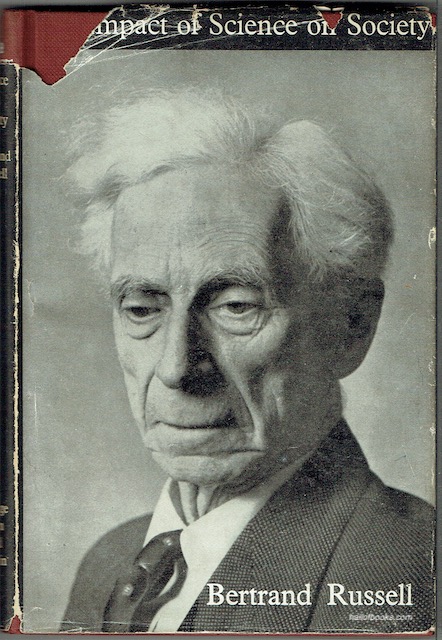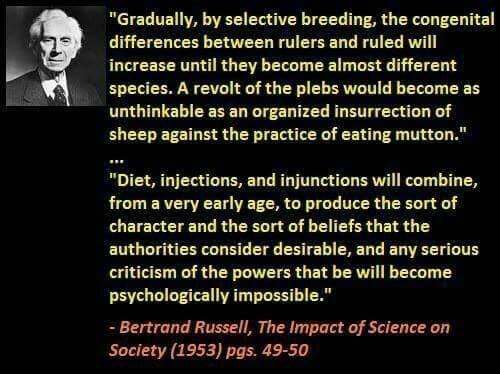THE IMPACT OF SCIENCE ON SOCIETY
Bertrand Russell
1953
“I shall consider scientific technique, especially since the industrial revolution. Last, I shall set forth the philosophy which is being suggested by the triumphs of science, and shall contend that this philosophy, if unchecked, may inspire a form of unwisdom from which disastrous consequences may result.”

This book is based upon lectures originally given at Ruskin College, Oxford, England (Jan/Feb 1950). Three of these– Chapter L “Science and Tradition,” Chapter II, “General Ejects of Scientific Techniques,” and Chapter VI, “Science and Values”–‘were subsequently repeated at Columbia University, New York, and published by the Columbia University Press.
None of the other chapters have been published before in the United States. The last chapter in the present book, “Can a Scientific Society be Stable?” ‘was the Lloyd Roberts Lecture given at the Royal Society of Medicine, London.
CHAPTER I
Science and Tradition
MAN has existed for about a million years. He has possessed writing for about 6,ooo years, agriculture somewhat longer, but perhaps not much longer. Science, as a dominant factor in determining the beliefs of educated men, has existed for about 3oo years; as a source of economic technique, for about r5o years. In this brief period it has proved itself an incredibly powerful revolutionary force. When we consider how recently it has risen to power, we find ourselves forced to believe that we are at the very beginning of its work in transforming human life. What its future effects will be is a matter of conjecture, but possibly a study of its effects hitherto may make the conjecture a little less hazardous.
The effects of science are of various very different kinds. There are direct intellectual effects: the dispelling of many traditional beliefs, and the adoption of others suggested by the success of scientific method. Then there are effects on technique in industry and war. Then, chiefly as a consequence of new techniques, there are profound changes in social organization which are gradually bringing about corresponding political changes. Finally, as a result of the new control over the environment which scientific knowledge has conferred, a new philosophy is growing up, involving a changed conception of man’s place in the universe.
I shall deal successively with these aspects of the effects of science on human life. First I shall recount its purely intellectual effect as a solvent of unfounded traditional beliefs, such as witchcraft. Next, I shall consider scientific technique, especially since the industrial revolution. Last, I shall set forth the philosophy which is being suggested by the triumphs of science, and shall contend that this philosophy, if unchecked, may inspire a form of unwisdom from which disastrous consequences may result.


On March 19, 1940, Albert Einstein wrote, “Great spirits have always encountered violent opposition from mediocre minds.” He wrote this in a letter to Morris Raphael Cohen, a professor of philosophy at the City College of New York, defending the appointment of Bertrand Russell to a teaching position. Bertrand Russell was a British philosopher, mathematician, historian, and social critic. The quote is stating that violent oppression is the actions taken by the establishment. Mediocre minds would be the bureaucrats staffing the establishment. In a sense, these are words of encouragement to those who would try to bring change.
HOW BERTRAND RUSSELL WAS PREVENTED FROM TEACHING AT THE COLLEGE OF THE CITY OF NEW YORK
October, 1956
After the retirement of the two full professors of philosophy, Morris Raphael Cohen and Harry Overstreet, the members of the Philosophy Department at the College of the City of New York, as well as the administration of the college, agreed
to approach an eminent philosopher to fill one of the vacant positions. The department recommended that an invitation be sent to Bertrand Russell, who was at the time teaching at the University of California. This recommendation was enthusiastically approved by the faculty of the college, the acting president, the administrative committee of the Board of Higher Education, and finally by the board itself, which passes on appointments at this level. Nobody comparable in fame and distinction had ever before been a professor at City College. Nineteen of the twenty-two board members attended the meeting at which the appointment was discussed, and all nineteen voted in favor of it. When Bertrand Russell accepted the invitation, Ordway Tead, the chairman of the board, sent him the following letter:
MY DEAR PROFESSOR RUSSELL:
It is with a deep sense of privilege that I take this opportunity of notifying you of your appointment as Professor of Philosophy at the City College for the period February 1, 1941, to June 30, 1942, pursuant to action taken by the Board of Higher Education at its meeting of February 26, 1940.
I know that your acceptance of this appointment will add luster to the name and achievements of the department and college and that it will deepen and extend the interest of the college in the philosophic basis of human living.
At the same time Acting President Mead issued a statement to the press to the effect that the college was singularly fortunate in securing the services of such a world-renowned scholar as Lord Russell. The data of this was February 24, 1940.
In view of later developments it is necessary to emphasize two facts. Bertrand Russell was to teach the following three courses and no others:
Philosophy 13: A study of modern concepts of logic and of its relation to science, mathematics, and philosophy.
Philosophy 24B: A study of the problems in the foundations of mathematics.
Philosophy 27: The relations of pure to applied sciences and the reciprocal influence of metaphysics and scientific theories.
Furthermore, at the time Bertrand Russell was appointed only men could attend day-session courses in liberal arts subjects at City College.
II
When Russell’s appointment was made public, Bishop Manning of the Protestant Episcopal Church wrote a letter to all New York newspapers in which he denounced the board’s action. “What is to be said of colleges and universities,” he wrote, “which hold up before our youth as a responsible teacher of philosophy . . . a man who is a recognized propagandist against both religion and morality, and who specifically defends adultery. . . . Can anyone who cares for the welfare of our country be willing to see such teaching disseminated with the countenance of our colleges and universities?” Returning to the offensive a few days later, the Bishop said, “There are those who are so confused morally and mentally that they see nothing wrong in the appointment . . . of one who in his published writings said, ‘Outside of human desires there is no moral standard.’ ” It should be remarked in passing that if it were a requirement for teachers of philosophy to reject ethical relativism in its various forms, as Bishop Manning implied, half or more
of them would have to be summarily dismissed.
The Bishop’s letter was the signal for a campaign of vilification and intimidation unequaled in American history since the days of Jefferson and Thomas Paine. The ecclesiastical journals, the Hearst press, and just about every Democratic politician joined the chorus of defamation. Russell’s appointment, said The Tablet, came as a “brutal, insulting shock to old New Yorkers and all real Americans.” Demanding that the appointment be revoked, it editorially described Russell as a “professor of paganism,” as “the philosophical anarchist and moral nihilist of Great Britain . . . whose defense of adultery became so obnoxious that one of his ‘friends’ is reported to have thrashed him.” The Jesuit weekly, America, was even more polite. It referred to Russell as a “desiccated, divorced, and decadent
advocate of sexual promiscuity . . . who is now indoctrinating the students at the University of California . . . in his libertarian rules for loose living in matters of sex and promiscuous love and vagrant marriage. . . . This corrupting individual . . . who has betrayed his ‘mind’ and ‘conscience.’ . . . This professor of immorality and irreligion . . . who is ostracized by decent Englishmen.” The letters to the editor in these periodicals were even more frenzied. If the Board of Higher Education did not rescind its action, said one correspondent in The Tablet, then “Quick sands threaten! The snake is in the grass! The worm is busy in the mind! Were Bertrand Russell honest even with himself, he would declare, as did Rousseau, ‘I cannot look at any of my books without shuddering; instead of instructing, I corrupt;
instead of nourishing, I poison. But passion blinds me, and, with all my fine discourses, I am nothing but a scoundrel.’ ” This letter was a copy of a telegram which had been sent to Mayor La Guardia. “I beg Your Honor,” it continued, “to protect our youth from the baneful influence of him of the poisoned pen—an ape of genius, the devil’s minister to men.”
The Charge
In 1940, Bertrand Russell was hired by the City College of New York to teach classes on logic, mathematics, and metaphysics of science. This appointment was made controversial by Dr. William Thomas Manning, the Episcopal Bishop of New York City, who argued that due to Bertrand Russell’s writings against religion and approval of sexual acts disapproved of by traditional Christian teachings, he should not be instated as a professor. Following Manning’s denunciation, a group of religious individuals lobbied New York City government institutions to reject Bertrand Russell’s position as professor. However, despite that pressure, Russell was confirmed by the New York Board of Higher Education. Following that decision, the matter was taken to the New York Supreme Court by Jean Kay, who argued that her daughter would be morally compromised should she study under Russell even though her daughter could not have been a student at CCNY, which then exclusively enrolled male students.
Court Case
The judge hearing the case was the Irish Catholic John E. McGeehan, who ruled against Russell’s appointment on three criteria. First, McGeehan argued that Russell should not be allowed to teach due to his status as a non-citizen of the United States, whom New York law prohibited from teaching in public schools. Second, McGeehan wrote that Russell was not given a competitive examination of his merit for the position to which he was appointed. Thirdly, McGeehan concluded that Russell held immoral views regarding sexuality on the basis of four of his popular and non-philosophic books (On Education, What I Believe, Education and the Modern World, and Marriage and Morals), and that his opinions regarding sexual relations between college-aged students amounted to an endorsement of abduction, rendering him morally unfit to teach philosophy and an advocate of lawlessness. In the books, Russell advocated for sex before marriage, homosexuality, temporary marriages, and the privatization of marriage, among other things.
Russell was prevented from appearing in court and an appeal by the American Civil Liberties Union was denied in several courts. The City of New York’s lawyers told the Board of Higher Education that the verdict would not be appealed. A few days later Mayor La Guardia removed the funds for the position from the budget.- WikiPedia
